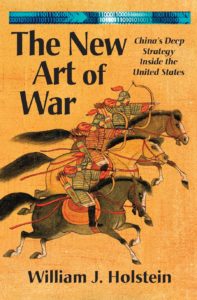The real worries about China in military, security and intelligence circles in Washington are these: the Chinese government has engaged in such a massive and consistent hacking campaign inside the United States that China has been able to obtain and develop critical technologies such as Artificial Intelligence. The government also has engaged in a pattern of planting agents in American companies and governmental institutions. Now China is on the verge of using the technologies it has either stolen and/or developed to challenge the American Navy in the South China Sea. China is also rolling out its advanced 5G telecommunications gear around the world, which is often accompanied by the use of “smart city” technology–meaning video cameras that monitor populations using AI algorithms. That is having the impact of boosting strong and often corrupt governments. Donald Trump’s tariffs will have zero impact on any of this.
As I argue in my new book, “The Art of War: China’s Deep Strategy Inside the United States,” (now available on Amazon), the response to Xi Jinping’s China has to start at home. We have to harden our very vulnerable computer systems and adopt strategies and policies that allow us to out-innovate the Chinese. I’m seeing online that some Americans are asking, “If we don’t use tariffs against China, what do we do?” Well, I provide some of the answers. Here is a taste:
–All government agencies involved in major Information Technology upgrades must assume that China’s party-state will attempt to penetrate their new systems.
–The Pentagon, particularly the Navy, must move swiftly to eliminate IT vulnerabilities.
–Keep Huawei and ZTE out of the push to 5G telecommunications networks in the United States and impose stringent inspections of all imported equipment.
–Key government agencies have to accelerate and improve their understanding of new, emerging technologies so they know what to protect and what not to protect.
–Companies of all sizes must embrace intrusion detection systems and employ skilled operators who can detect attacks. One compromised company in a supply chain can lead to compromises in all partner companies.
–CEOs must not continue to operate IT systems they believe may have been compromised by Chinese government hackers. It is worth the time and money to fix the underlying problem. National security is at stake.
–Companies that suspect they have insider threats should cooperate with federal authorities rather than trying to hide or conceal the problem.
–Companies should develop insider threat programs that scrutinize all areas of risk and do not single out Chinese or Chinese-Americans on the basis of their ethnicity.
–The scientific community, including the National Institutes of Health, needs to rethink its completely open approach to research.
–The number of Chinese students in the inner sanctums of research and development labs must be gradually reduced.
For more, read “The New Art of War.”




